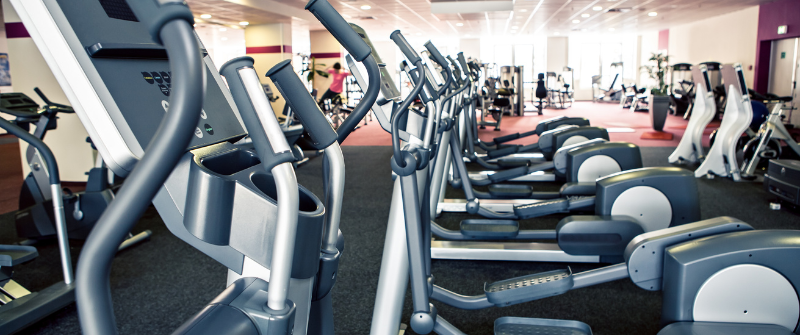
- by NEXO Team
- April 12, 2023
Operating a fitness gym business can be a rewarding and lucrative endeavor, but it’s not without its risks. From accidental injuries to equipment damage, gym owners face a range of potential liabilities that could result in reputation-damaging lawsuits or financial losses. That’s why having insurance coverage is essential for protecting your business, your employees, and your members.
Whether you’re just starting out or looking to update your current coverage, consider the 10 types of insurance every fitness gym business needs to run safely and with peace of mind:
1. Comprehensive General Liability Insurance
When it comes to running a fitness gym, general liability insurance is the most common type of insurance coverage to think about, and for good reason. General liability insurance protects your gym against claims of bodily injury or property damage resulting from your business operations.
Fitness gym owners typically use comprehensive general liability insurance to cover the following circumstances:
- Bodily Injury: If a gym member slips and falls while using gym equipment and suffers an injury, they may file a claim against the gym for medical expenses, lost wages, and pain and suffering. Comprehensive general liability insurance can cover these claims.
- Property Damage: If gym equipment malfunctions and damages a member's personal property, the member may file a claim against the gym for the cost of repairing or replacing the damaged property.
- Advertising Injury: If the gym's advertising is found to be misleading or infringing on someone else's intellectual property, they may file a claim against the gym for damages.
You can see why comprehensive general liability insurance is important for fitness gym owners, as it covers the costs of expensive medical bills, legal fees, and even settlements.
2. Commercial Property Insurance
Commercial property insurance protects your fitness gym’s building and the contents inside in case of property damage or loss caused by theft, vandalism, fire, or other natural disasters such as hail or tornadoes. The insurance will cover the cost of repairing the property or replacing its contents if an event were to happen.It’s also important to know that if you rent your space as part of a bigger building, you can get commercial property insurance for just your specific part of the building.
3. Business Equipment Insurance
If you have a lot of high-end technology and gym equipment, you may also benefit from business equipment insurance. It’s important to understand that even though your commercial property insurance covers the building and everything in it, business equipment insurance only covers the equipment, not the building itself. It can be quite costly to replace gym equipment if it is damaged or stolen.
If, for any reason, the equipment is damaged or not working, this policy should cover the cost to repair and replace it. If you take gym equipment outside of the gym for outdoor personal training sessions or boot camps, consider covering your equipment both inside and outside of the gym.
4. Professional Liability Insurance
Professional liability insurance, sometimes referred to as errors and omissions (E&O) insurance, covers claims of errors, negligence, or omissions made by your gym employees. In the fitness industry, this can include injuries resulting from poorly taught exercises or inadequate supervision.
For example, if a gym member claims someone on the staff gave them improper instruction on how to do a burpee that resulted in a back injury that then required rehab and loss of wages, you could quickly be out of business without professional liability insurance in place.
5. Workers’ Compensation
Workers’ compensation pays for employee injuries that happen while at work. For example, if one of your personal trainers is moving a piece of equipment and accidentally breaks their toe, workers’ compensation insurance will kick in to cover their medical and/or rehabilitation costs and lost wages while in recovery.
Workers’ compensation can even provide survivor benefits if a team member dies in the workplace. Although workers’ compensation can vary from state to state, the bottom line is that if you’re hiring staff, you’ll want this policy in place.
6. Cyber Insurance
Cyber insurance protects your gym in the event of a cyber attack. With digital fitness platforms, stored payment data, and a ton of personal customer information, cyber insurance is no longer optional. It’s a fitness gym owner’s responsibility to protect their members’ data.
Even if you think you have a good cybersecurity system in place, hacks and data breaches can still occur. Cyber insurance will protect your business from claims that are the result of personal customer data being hacked and stolen, and it’s that extra layer of protection you’ll be thankful you have in the case of digital fraudulent activity like a stolen credit card number.
7. Business Interruption Insurance
Business interruption coverage is designed to protect your fitness gym business’ income if an unforeseen event disrupts its operations. This coverage can help your business recover lost income, pay ongoing expenses, and cover the cost of relocation or temporary operations.
Business interruption insurance and commercial property insurance are often confused by gym owners, but there is a big difference between the two. A gym owner would use their commercial property coverage if their gym suffered a fire that damaged the property and forced it to temporarily close.
Commercial property coverage can help pay for the cost of repairing or replacing the damaged property. However, it would not cover the loss of income the business incurs during the closure. Business interruption coverage, on the other hand, would help cover the loss of income during the closure period.
8. Employment Practices Liability Insurance
Employment practices liability insurance (EPLI) can protect your gym from legal action arising from claims of discrimination, wrongful termination, harassment, or retaliation. As a gym owner, you may need EPLI to protect your business against lawsuits filed by employees or former employees.
Here are a few specific reasons why you may need EPLI insurance for your gym:
- Wrongful termination claims: If an employee believes they were terminated from their job unfairly, they may file a wrongful termination claim against your gym. EPLI can help cover the costs associated with defending against these types of claims.
- Discrimination claims: If an employee feels they have been discriminated against on the basis of their race, gender, age, or any other protected characteristic, they may file a discrimination claim against your gym.
- Harassment claims: If an employee experiences harassment in the workplace, they can file a claim.
- Retaliation claims: If an employee feels they have been retaliated against for reporting discrimination or harassment, they may file a retaliation claim against your gym.
Employment practices liability insurance can provide important protection for gym owners by helping to cover the costs associated with defending against these types of employee claims related to employment practices.
9. Special Event Insurance
Special event coverage is an insurance policy that provides coverage for a specific event or series of events.
Gym owners may need special event coverage if they plan to hold events that go beyond their typical gym activities, such as a fitness competition or charity event. This type of insurance can help protect owners from financial loss due to unforeseen circumstances that may occur during the event, such as property damage, bodily injury, or lawsuits.
Without this coverage, gym owners may be liable for any damages or injuries that occur during the event, which could result in significant financial loss.
Gym owners should talk to a licensed insurance agent to find out what kind of coverage they need for their event and to make sure they have enough protection in place to cover any risks or liabilities that might come up.
10. Excess and Umbrella Insurance
Excess and Umbrella insurance are types of liability insurance policies that provide additional coverage above and beyond the limits of a primary liability policy. These policies are typically purchased by businesses or individuals who want to protect themselves from catastrophic losses or lawsuits that exceed the limits of their primary liability insurance coverage.
For gym owners, excess and umbrella insurance can provide an extra layer of protection against lawsuits or claims that may arise from accidents or injuries that occur on their premises.
- Excess Insurance: This type of insurance for gyms provides additional coverage for a specific type of loss or risk that is already covered by an underlying insurance policy. For example, if a gym owner has a $1 million liability insurance policy and a claim is made against them for $1.5 million, their excess insurance policy would cover the additional $500,000.
- Umbrella Insurance: Provides coverage for multiple types of risks and may also provide coverage above and beyond the limits of an underlying insurance policy.
Key Takeaways
Overall, running a fitness gym business requires a lot of hard work and dedication. Getting the right insurance for your gym can give you peace of mind and protect you from possible financial and legal risks. To learn more about insurance for gym owners, contact NEXO Insurance Services today!
Categories
Fill out a short form to contact us with your questions or to receive a customized quote.
Recent Posts
-
 Injury Waivers Aren’t Enough: Insurance Gaps Jiu-Jitsu Owners Overlook
January 21, 2026
Injury Waivers Aren’t Enough: Insurance Gaps Jiu-Jitsu Owners Overlook
January 21, 2026 -
 How Gym Risk Management Can Lead to Lower Premiums Over Time
January 21, 2026
How Gym Risk Management Can Lead to Lower Premiums Over Time
January 21, 2026 -
 Why Combat Sports Gyms Pay More for Insurance and How to Control Costs
January 21, 2026
Why Combat Sports Gyms Pay More for Insurance and How to Control Costs
January 21, 2026 -
 Functional Fitness Injury Trends That Impact Insurance Underwriting
January 21, 2026
Functional Fitness Injury Trends That Impact Insurance Underwriting
January 21, 2026 -
 Why Pilates Studios Face Unexpected Liability Despite Being Low-Impact
January 21, 2026
Why Pilates Studios Face Unexpected Liability Despite Being Low-Impact
January 21, 2026
